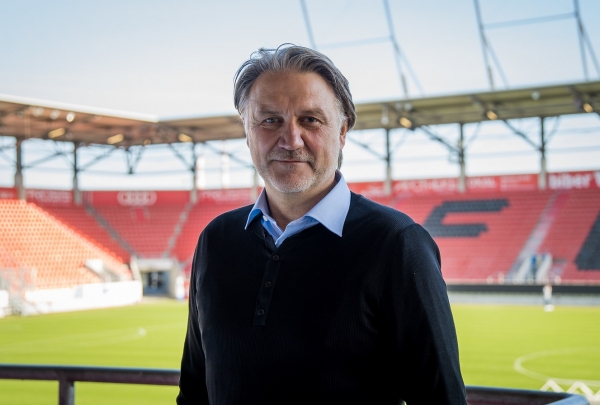
You have been managing director of the “Schanzer,” as FC Ingolstadt 04 is known, since the fall of 2021. How has the club developed since then?
Beiersdorfer: Our first team was in a difficult situation at the time and got off to a bad start in the 2. Bundesliga. After we had made changes to the coaching staff, our performance improved, but unfortunately, we were unable to avoid relegation in the spring. We reorganized ourselves for the 2022/23 season and, among other things, integrated several promising players from our youth development system into the professional squad. We started the season well and were within striking distance of the promotion places before the winter break. However, the young squad and major injury problems threw us off course in the spring of this year.
How does the club intend to strengthen its work with young talent in order to become more competitive again at the professional level?
Beiersdorfer: Due to the developments and challenges of the past years, the present and the future, we are now trying even harder to focus on the work in our youth and academy teams. Transfers in the recent past have shown us that this is the right way and also the necessary way. Filip Bilbija has moved up a league to Hamburger SV – although unfortunately on a free transfer. And for Merlin Röhl, who was transferred to SC Freiburg, we received a remarkable transfer fee. Since media revenues in the 3. Liga are nowhere near as high as in the two leagues above it, it is important for us to train players in an even more targeted manner and to enable them to make the transition to professional football with the help of squad management that is focusing on the future of the club. After all, players who come from our youth teams and play for the professional team are important sources of identification.
FC Ingolstadt 04’s work with young talent already begins at the Audi Schanzer Football School. What role does it play in the club’s concept?
Beiersdorfer: The Audi Schanzer Football School is one of our flagships. We move 10,000 children every year: regionally, nationally and internationally at different locations. Although we are not the bestknown club in Germany, we have the largest football school of every club in the country. We want the boys and girls there to benefit from our knowledge and have fun, for example also in inclusion camps. Some of the children from the football school have already ended up with us in our youth and academy teams. In addition, we also pull many coaches up into our teams at the club. This makes the Audi Schanzer Football School a wonderful talent ladder for us.
In 2019, FC Ingolstadt 04 was the first club to install a skills.lab Arena on its training ground. What is the focus in your work with the system?
Beiersdorfer: It starts with development training for our players in the youth teams center and continues with individual training sessions with the professionals and rehabilitation sessions. In the skills.lab Arena, we can use match-like scenarios to promote decisionmaking and train precision. Additionally, there are exercises to train first contact, passing and game awareness, among other things. We also open up the skills.lab Arena to schools, hobby players or other external groups to maximize usage. The system is simply something special that you don’t find on every corner. Our goal is therefore to market the Arena even more to the outside world in the future, without neglecting valuable training time for our players.
How will the skills.lab Arena help to get back on the road to success in the long term, even in the professional sector?
Beiersdorfer: We are currently working on capturing and documenting the data that each player generates in the Arena. Discussions with Anton Paar SportsTec and their partners have shown how beneficial this data can be when it comes to the long-term performance development of young players. That is why we are devoting ourselves intensively to this aspect in particular, in order to be able to use the full spectrum of the skills.lab Arena in the future.